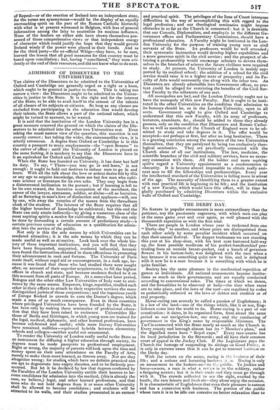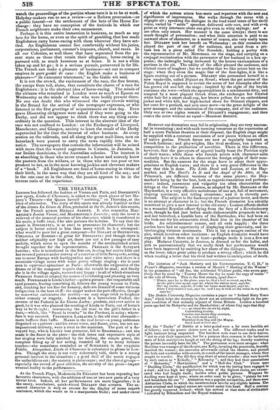THE DERBY DAY.
No feature in popular amusements is more extraordinary than the patience, nay the passionate eagerness, with which men can play at the same game over and over again, as well pleased with the thousandth repetition as with the first trial.
There are people in London whose year is reckoned from one " Derby-day " to another, and whose years are distinguished from each other solely by some peculiar incident which occurred on that their annual festival. The dapper tradesman we saw standing this year at his shop-door, with his best coat buttoned half-way up, the least possible modicum of his pocket-handkerchief pro- truding from an outside breast-pocket, and a bunch of geranium flowers in his button-hole, was delighted with the race when a boy because it was something quite new to him, and is delighted with it now he is a man because it is something with which he is quite familiar.
Society has the same pleasure in the mechanical repetition of
games as individuals. All national amusements become institu- tions as much as their governments, and are equally conducted according to conventional rules. The times at which we dance, and the formalities to be observed at balls—the time when races are to take place, and the laws of the turf—are regulated by codes as pedantically enforced as the laws of debtor and creditor or of real property.
Horse-racing can scarcely be called a passion of' Englishmen ; it
is a law of the land—one of the things which, like it or not, Eng- lishmen come into the world to do. florae-racing is a part of our constitution : it dates, in its organized form, from about the same period as our navigation-law, our army, and the conducting of government in the King's name by responsible Ministers. The Turf is connected with the State nearly as much as the Church is. Every county and borough almost has its "Member's plate," and the dignified races have " Royal cups." Every race-course has its local jurisdiction in the Stewards ; and all have their common court of appeal in the Jockey Club. If the Legislature pays the Church the homage of suspending its sittings on Good Friday, it is only in extreme cases that it can be got to transact business on the Derby day. With the actors on the scene, racing is 1110 business of their life ; and a serious and harassing business it is. Racing is only an amusement to the lookers-on—to the public. To jockies and horse-owners, a race is what a rev:cw is to the soldiery, rather a fatiguing matter; but it is their trade and they must go through with it. The crowds collected to see the sight, excited by the bustle, the rare leisure and fresh air—they alone enjoy the occasion. It is characteristic of Englishmen that even their pleasure is earnest and has a connexion with business. The portion of the public whose turn it is to be idle can conceive no better relaxation than to
watch the proceedings of the portion whose turn it is to be at work. Holyday-makers run to see a review—or a Reform procession—or a public funeral—or the settlement of the bets of the Horse Ex- change : they have no conception of the festivals in which our French neighbours make their own amusement.
Perhaps it is this entire immersion in business, as much as any love for the horse, or even as the spirit of gambling, that has made Englishmen carry horse-racing with them wherever they have set- tled. An Englishman cannot live comfortably without his juries, corporations, parliament, coroner's inquests, church, and races. In all our Colonies, as well those that have separated from the pa- rent state as those that retain their allegiance, horse-racing is pursued with as much keenness as at home. It is not a whim taken up and let go ; it is a serious pursuit, persevered in for life. The French can make a pleasure of business—set out to conquer empires in pure gathle de cteur : the English make a business of pleasure—" us s'amusent tristement," as the Gallic wit said. It is not the crowd, the excitement of the race, the free breeze, the escape from toil, alone, that constitute the charm of a race for Englishmen : it is the abstract idea of horse-racing. The minds of the citizens who remained in London were as much at Epsom on Wednesday as the minds of those who were bodily present there. No one can doubt this who witnessed the eager crowds waiting in the Strand for the arrival of the newspaper expresses, or who listened to the first greetings of acquaintances on that day. Even grave Dissenting clergymen were asked if they were going to the Derby, and did not appear to think there was any thing extra- ordinary in the question. This interest in the abstract idea of the race was not confined to London : on the Exchanges of Liverpool, Manchester, and Glasgow, anxiety to learn the result of the Derby superseded for the time the interest of other business. At every station on the railroads, and all along the great mail-lines, men on horseback were posted to carry the news rapidly into the in- terior: The newspapers that contain the information will be seized with more than the wonted eagerness in Canada, in Jamaica, in our Indian dominions, in the Australian colonies. The interest is as absorbing in those who never crossed a horse and scarcely know the pastern from the withers, or in those who are too poor or too prudent to bet, as in the most knowing jockies and cleverest makers of a "book." All Englishmen are fond of horse-racing in virtue of their birth, in the same way that they are all fond of the sea ; and in the one case as in the other, the passion appears to be in the inverse ratio of the experience.



























 Previous page
Previous page